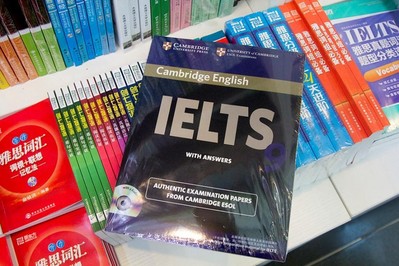 返回
教育头条
返回
教育头条

如何在雅思口试中词汇部分拿高分 雅思备考
雅思如何在口试中词汇部分拿高分? 雅思考试已经近在眼前了。不知道各位考生们现在是否已经制定好了适合自己的复习备考计划。下面小编对雅思如何在口试中词汇部分拿高分做了总结,希望能帮到即将考试的各位考生们,下面一起来看看吧~
There are three aspects that examinersare particularly listening for.
口语考官会特别留意以下三个方面:
What do you need to do to gain a good grade for vocabulary inyour speaking interview?
The most important need, of course,is for you to have a sufficient store of words which you can usecorrectly to adequately express your meaning to the examiner.
Beyond this, though, there are threekey aspectsof vocabularythat the examiner will be paying close attention to. If you canshow a reasonable capability in these, you improve yourchances of achieving a higher score.
Let's consider first the difference between the requirements for band 6 and band 7 performance in vocabulary (or Lexical Resource, as it is called in the official IELTS terminology).
Lexical ResourceThe Public Version band descriptors for Speaking say that a band 6 score means the speaker has enough vocabulary to be able to discuss topics at length, although there may be some errors, and the speaker can generally paraphrase if required. A band 7 score has some extra requirements:
an ability to use less common words, some idioms, and some awareness of collocations and style.
Speaking at this level does not mean perfection. There may be occasional mistakes in word choice, but again the speaker is able to paraphrase effectively if required.
Most IELTS candidates are trying to achieve at least 6.5 in their Speaking, which means at least two band 7 scores are needed from the four categories, if two remain at band 6 level. Thus, investing your time to develop your strengths in these extra vocabulary areas is well worthwhile.
雅思口语评分标准7-9分中词汇部分,都提到了运用idiomatic language,且越灵活准确的运用它们lexicalresource部分分数会越高。
What are ''less common words''?
Another way of saying ''less common'' is not used so often. In the IELTS speaking interview, this means a candidate is using words or phrases in his or her answers that are not used by most candidates. Here are a few examples:
Q: Do you like going to the cinema?A1.: Yes, I do. I really like movies, especially dramas and romantic comedies.
A2: Yes, I'm a keen moviegoer, and I especially enjoy dramas and rom-coms.
There is nothing at all wrong with answer no 1, but A2 responds with less commonly used terms. To be ''keen'' (on something) is an informal way of saying that you are enthusiastic, while ''moviegoer'' and the modern form ''rom-com'' for romantic comedy shows the speaker probably has a wider vocabulary range and a sense of some style, the way a native English speaker might answer.
Less common words are often words which could be considered to be at a “higher level.”
Let's look at another sample in response to a Part 3 question about the importance of learning a second language:
Well....while I believe everyone gains from having some knowledge of another language, Iwouldn't say it's critical for those who foresee themselves working as, say, farmers ortradespeople in their local area when they grow up. Not everyone has the same aptitude forlanguage learning and their skills might well be stronger in other subjects.
But for those who are looking for professional careers, particularly with large companies, I'dsay the ability to function with reasonable proficiency in another language is becomingincreasingly vital. People aspiring to higher positions within multinational companies where theremay be a need to travel and/or to deal with colleagues or clients who speak the other languagewill probably need to be able to show this capability.
This answer uses a number of less common words: critical, foresee, aptitude, function, proficiency, vital, capability.
The meaning would have been exactly the same by saying, e.g, that it's increasingly importantto learn a language for those wantinghigher positions, and they will need to be able to show that they can do this, but the less common words will certainly be noted by the examiner.
Idioms.
These are the words and phrases that native speakers sometimes use which sound odd unless we have learnt what the actual meaning is. You probably already know some of these, and if you can produce one or two in your interview, it will be noted by the examiner.
Q: How often do you go to the cinema?
A: Justonce in a blue moon really. I'd like to go more often but I just don't get the chance.
Q: Do you ever buy clothes online?
A: No...to me it's like buying a pig in a poke.You can never be sure that the size and colour will becorrect as shown.

A search for ''English idioms'' online should give you access to good, free sites with many examples of these phrases and expressions.
There are some important points to note, though. Idioms can't be ''forced'' into a conversation without the natural context for them, and they must be 100% correct – a word or two incorrect and the phrase may not be understood by the listener.
Another point is that these are part of informalconversation and writing.
Do not use them in T2 essays for the Writing test.
There are three aspects that examinersare particularly listening for.
口语考官会特别留意以下三个方面:
What do you need to do to gain a good grade for vocabulary inyour speaking interview?
The most important need, of course,is for you to have a sufficient store of words which you can usecorrectly to adequately express your meaning to the examiner.
Beyond this, though, there are threekey aspectsof vocabularythat the examiner will be paying close attention to. If you canshow a reasonable capability in these, you improve yourchances of achieving a higher score.
Let's consider first the difference between the requirements for band 6 and band 7 performance in vocabulary (or Lexical Resource, as it is called in the official IELTS terminology).
Lexical ResourceThe Public Version band descriptors for Speaking say that a band 6 score means the speaker has enough vocabulary to be able to discuss topics at length, although there may be some errors, and the speaker can generally paraphrase if required. A band 7 score has some extra requirements:
an ability to use less common words, some idioms, and some awareness of collocations and style.
Speaking at this level does not mean perfection. There may be occasional mistakes in word choice, but again the speaker is able to paraphrase effectively if required.
Most IELTS candidates are trying to achieve at least 6.5 in their Speaking, which means at least two band 7 scores are needed from the four categories, if two remain at band 6 level. Thus, investing your time to develop your strengths in these extra vocabulary areas is well worthwhile.
雅思口语评分标准7-9分中词汇部分,都提到了运用idiomatic language,且越灵活准确的运用它们lexicalresource部分分数会越高。
What are ''less common words''?
Another way of saying ''less common'' is not used so often. In the IELTS speaking interview, this means a candidate is using words or phrases in his or her answers that are not used by most candidates. Here are a few examples:
Q: Do you like going to the cinema?A1.: Yes, I do. I really like movies, especially dramas and romantic comedies.
A2: Yes, I'm a keen moviegoer, and I especially enjoy dramas and rom-coms.
There is nothing at all wrong with answer no 1, but A2 responds with less commonly used terms. To be ''keen'' (on something) is an informal way of saying that you are enthusiastic, while ''moviegoer'' and the modern form ''rom-com'' for romantic comedy shows the speaker probably has a wider vocabulary range and a sense of some style, the way a native English speaker might answer.
Less common words are often words which could be considered to be at a “higher level.”
Let's look at another sample in response to a Part 3 question about the importance of learning a second language:
Well....while I believe everyone gains from having some knowledge of another language, Iwouldn't say it's critical for those who foresee themselves working as, say, farmers ortradespeople in their local area when they grow up. Not everyone has the same aptitude forlanguage learning and their skills might well be stronger in other subjects.
But for those who are looking for professional careers, particularly with large companies, I'dsay the ability to function with reasonable proficiency in another language is becomingincreasingly vital. People aspiring to higher positions within multinational companies where theremay be a need to travel and/or to deal with colleagues or clients who speak the other languagewill probably need to be able to show this capability.
This answer uses a number of less common words: critical, foresee, aptitude, function, proficiency, vital, capability.
The meaning would have been exactly the same by saying, e.g, that it's increasingly importantto learn a language for those wantinghigher positions, and they will need to be able to show that they can do this, but the less common words will certainly be noted by the examiner.
Idioms.
These are the words and phrases that native speakers sometimes use which sound odd unless we have learnt what the actual meaning is. You probably already know some of these, and if you can produce one or two in your interview, it will be noted by the examiner.
Q: How often do you go to the cinema?
A: Justonce in a blue moon really. I'd like to go more often but I just don't get the chance.
Q: Do you ever buy clothes online?
A: No...to me it's like buying a pig in a poke.You can never be sure that the size and colour will becorrect as shown.

A search for ''English idioms'' online should give you access to good, free sites with many examples of these phrases and expressions.
There are some important points to note, though. Idioms can't be ''forced'' into a conversation without the natural context for them, and they must be 100% correct – a word or two incorrect and the phrase may not be understood by the listener.
Another point is that these are part of informalconversation and writing.
Do not use them in T2 essays for the Writing test.
谢谢你,阅读了这篇文章。我是教育宝学习顾问王敏,如何选择雅思是一个比较复杂的问题,雅思市场鱼龙混杂,广告铺天盖地,每家机构都把自己包装的天花乱坠,如何选择一家合适的机构?这是很多人都头疼的问题,选错机构不是费钱,而是浪费时间。教育宝始终保持中立客观,累计服务200万用户,致力于连接培训机构和学员,打造可靠、高效、让人放心的一站式互联网学习服务平台,如果你不知道雅思机构如何选,那么请让我来帮助你,加我微信:18560125702,我会根据你的实际需求,依靠8年从业经验,从海量课程中选择适合您的服务。返回教育宝头条
【免责声明】本文仅代表作者本人观点,与教育宝无关。教育宝对文中陈述、观点判断保持中立,不对所包含内容的准确性、可靠性或完整性提供任何保证。请读者仅作参考,特此声明!





